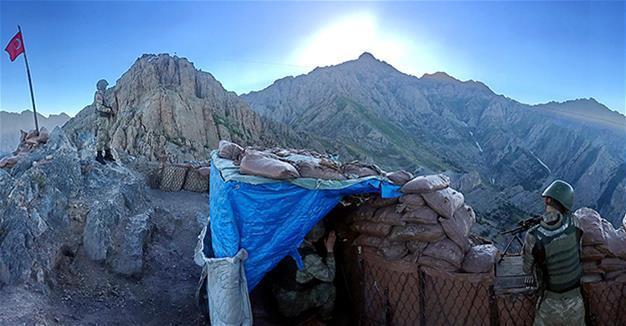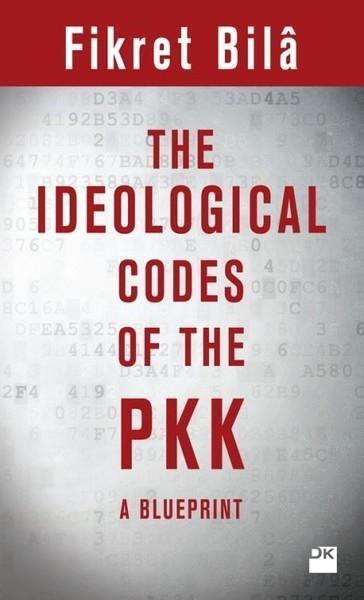‘The Ideological Codes of the PKK’ by Fikret Bila
William Armstrong - william.armstrong@hdn.com.tr

Turkish soldiers keep watch near the Iraqi border against outlawed Kurdistan Workers’ Party (PKK) militants in the Dağlıca region of the southeastern province of Hakkari. DHA photo
‘The Ideological Codes of the PKK: A Blueprint’ by Fikret Bila, translated by Gülşah Dikmeci (Doğan Kitap, 223 pages, 25TL)With the ongoing war in Syria and the U.S.’s recent anti-ISIL alliance with the Syrian Kurdish People’s Protection Units (YPG), more attention is being paid to the latter’s ideological bedfellows, the Kurdistan Workers’ Party (PKK). The group has been waging a war for over 30 years against the Turkish state, in a conflict that has killed almost 50,000 people and disrupted the lives of many more.
 “The Ideological Codes of the PKK: A Blueprint” by Fikret Bila does not linger over the psychological, material and political damage wrought by the insurgency and the response by the authorities. Instead, Bila, currently the editor-in-chief of the Turkish version of Hürriyet, examines the motivating ideological convictions of the PKK over the years. As the blurb states, the book aims to “demystify the meaning and purpose of each of the group’s many tentacles, undertaking a deep dive into the ideology that motivates it in war and peace.”
“The Ideological Codes of the PKK: A Blueprint” by Fikret Bila does not linger over the psychological, material and political damage wrought by the insurgency and the response by the authorities. Instead, Bila, currently the editor-in-chief of the Turkish version of Hürriyet, examines the motivating ideological convictions of the PKK over the years. As the blurb states, the book aims to “demystify the meaning and purpose of each of the group’s many tentacles, undertaking a deep dive into the ideology that motivates it in war and peace.” The PKK has had to reinvent itself constantly over the years. Most recently, the group’s Syrian wing has even begun attracting idealistic young recruits from across America and Europe. After the end of the Cold War, the PKK gave up its ideological commitment to Marxism and adopted the ideas of an obscure American political theorist Murray Bookchin on how to create a new society.
The Syrian Kurdish YPG’s attritional ground campaign against ISIL has garnered it flattering coverage in many Western media outlets. Brave, photogenic young feminist ecowarriors contrast sympathetically with barbaric jihadists. In the wasteland of the Syrian war, the Kurds’ apparently socialist, feminist, ecological project has also won admiration in the West.
But from the Turkish government’s perspective this project looks rather threatening. As the U.S.-backed People’s Democratic Union Party (PYD) bids to establish autonomous zones across the border, many see it as a Trojan horse: The first step on the path to carving out territory from southeast Anatolia. The situation in northern Syria was among the main drivers behind the reigniting of Turkey’s war against the PKK after a three-year ceasefire in summer 2015.
“The Ideological Codes of the PKK” is a highly critical examination of the ideology behind the networks cultivated by the PKK and its many dizzyingly acronymed affiliates. Bila details Bookchin’s heady theorizing based on “social ecology,” “communalism” and “confederalism” He shows how jailed PKK leader Abdullah Öcalan tried to adapt these ideas to the Kurdish context, under the umbrella of the Kurdistan Communities Union (KCK).
Bila stresses that the YPG in northern Syria is umbilically connected to the PKK in Turkey and northern Iraq, with a goal that has remained unchanged from its founding in the 1970s. Far from being a “communal” utopian project, he argues, the KCK’s ultimate goal is an exclusive nation-state project full of destructive internal contradictions.
The PKK’s ideological convictions are certainly intricate, but it is easy to overestimate their importance. Perhaps more key is the motivation provided by the sense of self-fulfillment provided for members by the group. As in other embattled collectives, the PKK appeals to a sense of shared destiny and struggle among its members. Its ideological convictions merely give sympathizers an attractive overlay to the more elemental, emotional gratification.
But there is certainly value in taking a close look at the group’s ideology. Foreign fighters with experience of the YPG have often commented on its exhausting “ideological training” sessions, heavy on the theorizing of Öcalan and Bookchin. “The Ideological Codes of the PKK” gives an unforgiving look at the kind of things those recruits are taught.
















